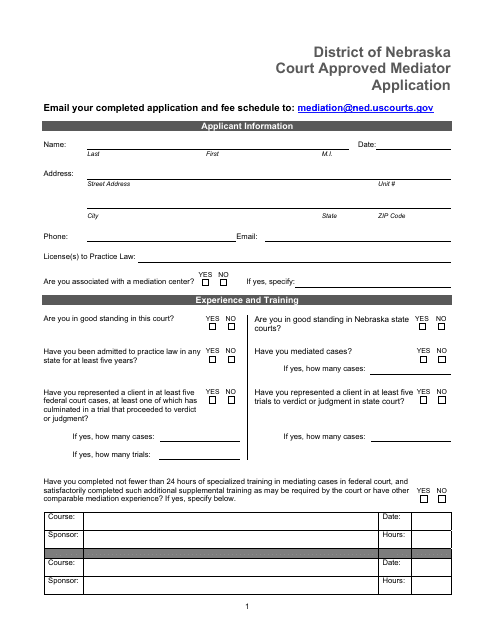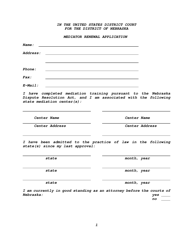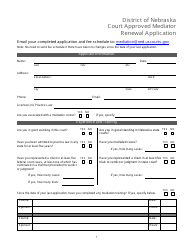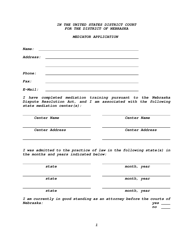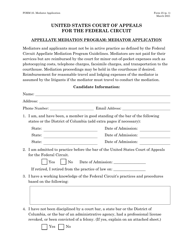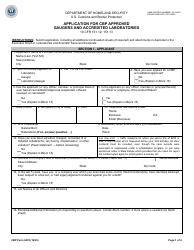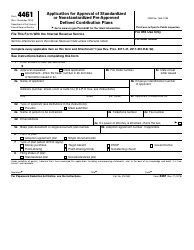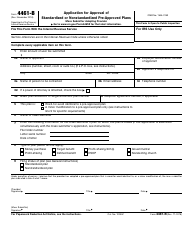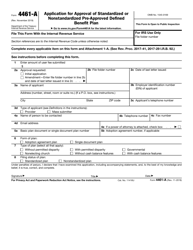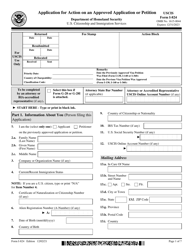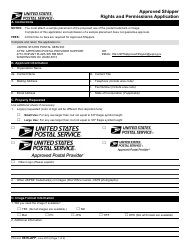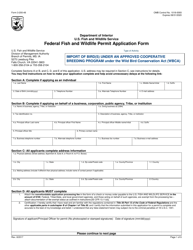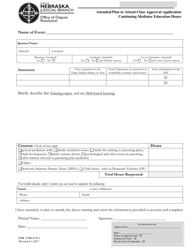Court Approved Mediator Application - Nebraska
Court Approved Mediator Application is a legal document that was released by the United States District Court for the District of Nebraska - a government authority operating within Nebraska.
FAQ
Q: What is a Court Approved Mediator?
A: A Court Approved Mediator is a neutral third-party who helps parties in a dispute reach a settlement outside of court.
Q: Why would I need a Court Approved Mediator?
A: You may need a Court Approved Mediator if you are involved in a legal dispute and would like to resolve it through mediation instead of going to trial.
Q: How do I become a Court Approved Mediator in Nebraska?
A: To become a Court Approved Mediator in Nebraska, you need to submit an application to the Nebraska Office of Dispute Resolution and meet the required qualifications and training standards.
Q: What are the qualifications and training standards to become a Court Approved Mediator in Nebraska?
A: The qualifications and training standards to become a Court Approved Mediator in Nebraska vary depending on the type of mediation you wish to practice. Generally, you need a bachelor's degree, completion of an approved mediation training course, and experience in conducting mediations.
Q: Can anyone be a Court Approved Mediator?
A: No, not everyone can be a Court Approved Mediator. You need to meet certain qualifications, complete the necessary training, and be approved by the court in order to practice as a Court Approved Mediator.
Q: What is the role of a Court Approved Mediator?
A: The role of a Court Approved Mediator is to facilitate communication and negotiation between parties in dispute, help identify issues, clarify interests, and assist in reaching a mutually acceptable resolution.
Q: What types of disputes can a Court Approved Mediator handle?
A: A Court Approved Mediator can handle various types of disputes, including family disputes, civil disputes, small claims disputes, and other types of legal conflicts.
Q: Is mediation legally binding?
A: No, mediation is not legally binding. However, if a settlement is reached during mediation, it can be recorded and enforced as a legally binding agreement.
Q: How much does mediation cost?
A: The cost of mediation varies depending on the mediator and the complexity of the dispute. Some mediators charge an hourly rate, while others may have a fixed fee for their services.
Q: Is mediation confidential?
A: Yes, mediation is confidential. The discussions and information shared during mediation are generally not admissible as evidence in court.
Form Details:
- The latest edition currently provided by the United States District Court for the District of Nebraska;
- Ready to use and print;
- Easy to customize;
- Compatible with most PDF-viewing applications;
- Fill out the form in our online filing application.
Download a fillable version of the form by clicking the link below or browse more documents and templates provided by the United States District Court for the District of Nebraska.
